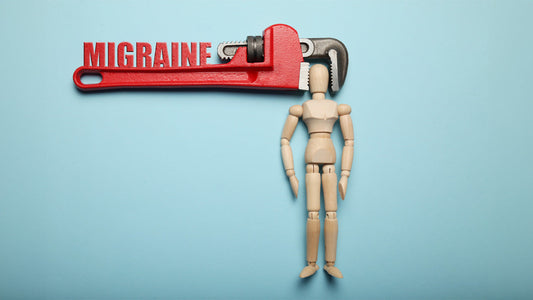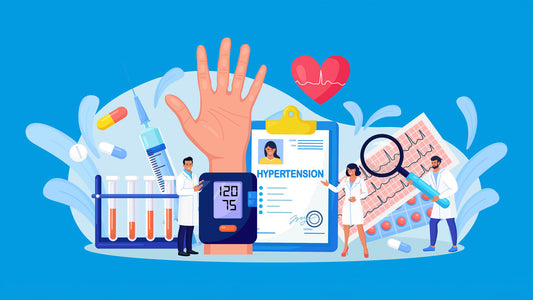Whether you're on the quest for luscious locks or radiating skin, adding a little biotin to your life can go a long way.
As a member of the water-soluble B vitamin family, biotin helps in energy metabolism, immune function, the nervous system, and, yes, keeping hair, skin, and nails healthy.
But there's also some research to suggest that biotin may play a role in weight management. And while there are some studies supporting its efficacy for weight loss, there are several claims that biotin does the opposite - it causes weight gain.
If you've started taking biotin supplements to lose weight but noticed the opposite, this article is for you. We’ll explore the link between biotin, metabolism, and weight gain, and share our best diet and lifestyle tips.
Key Takeaways
- Biotin (vitamin B7) doesn’t inherently cause weight gain; it supports energy metabolism.
- Perceived changes are more likely due to diet, fluid shifts, or training—not biotin itself.
- Biotin is common in multis for hair/skin/nails; dosing should remain within evidence-based ranges.
- If you’re tracking labs (thyroid, troponin), follow test prep guidance as biotin may interfere at high doses.

What Is Biotin And What Does It Do

You've probably heard about a B complex before.
It combines the eight water-soluble vitamin B types that are essential for energy, cognitive health, and red blood cell production. B7 (biotin) is often overlooked.
If you've heard anything about biotin, it's likely about hair and skin health, and while biotin is critical for supporting tissue growth and maintenance, it has much more to offer.
One of its primary roles is, like all the B vitamins, in energy metabolism - it helps your body convert dietary components (protein, carbohydrates, and fat) into a usable energy form (ATP). So it's pretty key to our well-being, making biotin an essential nutrient.
Most of its roles are as a co-factor for five carboxylases involved in fatty acid, amino acids, carbohydrate metabolism, polyketide biosynthesis, urea utilization, and a host of other cellular processes. (1)
But because biotin has such heavy involvement in energy metabolism, insufficient biotin intake can interfere with metabolic functions and lead to side effects associated with a sluggish metabolism, such as fatigue, low energy, weight gain, digestive problems, poor glucose control, and mood irregularities.
It doesn't stop there. Your body also needs biotin for: (2, 3)
- Keratin production (hair, skin, nails)
- Embryonic growth and development
- Nervous system function
- Chromatic structure (DNA)
- Gene expression
Our bodies do not produce biotin in significant amounts, so it must be obtained through diet or supplements. And meeting the recommended dietary allowance is crucial.
5 Benefits of Biotin

1. Boosts metabolism
Biotin supports metabolic function by aiding enzymes involved in gluconeogenesis, fatty acid metabolism, and amino acid catabolism. (4) Biotin is critical for supporting and maintaining metabolic homeostasis.
In the simplest terms, biotin helps with the breakdown and metabolism of fat, carbohydrates, and amino acids to provide your body with energy. Studies show that when combined with chromium picolinate, which is involved in glucose and insulin resistance regulation, it could increase metabolic rate and nutrient metabolism. (5)
However, while combining biotin and chromium may support key metabolic processes involved in weight management, they're not wonder weight loss pills. They won't substitute for hard work and willpower.
2. May improve hair growth
Biotin has always been touted for its beneficial effects on hair growth and its ability to reverse hair loss. Although there's little concrete evidence that biotin is essential for hair growth, some studies show positive results for stimulating keratin production in hair and increasing follicle growth rate.
Some studies have found that three to six months of biotin supplementation promote hair growth and reduce hair loss. (6, 7) It also improves hair volume, scalp coverage, and thickness and increases shine, moisture, and hair smoothness.
And because a biotin deficiency has been linked to thin and brittle hair, it's believed that supplementation can combat these issues and help promote hair health and growth. (8)
3. Strengthens nails
As with hair growth, there's not a big pool of research to draw from concerning biotin's role in nail health, but because of its role in energy metabolism and keratin production, biotin supplementation could theoretically support healthier nails.
While a biotin deficiency is relatively rare, it generally manifests as dermal abnormalities, such as dry, scaly skin, rashes, and brittle nails. (9)
4. Regulates blood sugar
If you're looking to lose weight and prevent weight gain, regulating blood sugar is a massive piece of the puzzle. And while it involves more than just popping back a supplement, something like biotin can be a good step in the right direction.
For people with diabetes, biotin stimulates liver glucokinase activity, increases insulin production, and enhances glucose uptake in muscle cells to reduce blood sugar levels and regulate glucose control. (10-12)
Several promising studies are alluding to the role of biotin in lowering blood glucose in people with type 1 and 2 diabetes. (13) Improving blood sugar control can significantly impact weight management and overall health.
5. Boost immune function
In addition to vitamin C, vitamin D, zinc, and other immune boosters, biotin may also support healthy immune responses. It's essential to the proper function of several types of immune cells, including T-lymphocytes (T-cells) and natural killer (NK) cells, which are paramount for innate and adaptive immune responses. (14) As such, a biotin deficiency compromises various immune functions, including:
- Antibody synthesis
- Spleen cell count
- B lymphocytes in the spleen
- Thymocyte maturation
- Cell proliferation
- Dendritic cell function
- Pro-inflammatory cytokine secretion
Biotin Supplements And Weight Gain: Is There A Link?

While there's no shortage of roles for biotin in the human body, what's this we hear about biotin and weight gain? Despite talk about biotin supplements packing on the pounds, there's no scientific research to support the claims.
Some of the logic backing these claims is based on:
- Biotin's ability to enhance energy metabolism, which can make the digestive process more efficient and lead to increased hunger
- Biotin's role in glucose regulation can lower blood glucose and lead to hunger urges
However, there's little to go on when it comes to finding science to back these up. That said, some research suggests that excessive intake of B vitamins is strongly linked with the prevalence of obesity and diabetes. (15)
But in terms of biotin causing weight gain, take it with a grain of salt.
While taking biotin in high doses is generally safe, it’s always best to consult with a healthcare provider.
On the contrary, some research shows that biotin may support weight loss due to its role in energy metabolism and glucose regulation. Ensuring proper biotin intake through dietary supplements or biotin rich foods can help maintain overall metabolic health.
Our 5 Best Tips For Keeping The Pounds Off
Losing weight is never fun. If you've struggled to lose weight and keep it off, you're not alone - it can be frustrating, defeating, and downright annoying! But lucky for you, there is a light at the end of the tunnel.
Diet and lifestyle significantly influence body weight. Getting these aspects under control can help you lose weight effectively.
Here are some of our best tips to help you lose weight quickly and effectively:
1. Get enough sleep
Sleep is crucial for weight management. Lack of sleep leads to hormonal imbalances (ghrelin, leptin, cortisol) and higher energy intake. (16, 17) Aim for 7-8 hours of quality sleep each night. If you struggle with sleep, check your sleep hygiene and consider a bedtime routine.
2. Focus on your macronutrients
Macronutrients (proteins, carbohydrates, and fats) provide your body with energy. Examine your diet: Are you eating enough protein? Too many carbs or unhealthy fats? Aim for a balanced mix of lean protein, complex carbohydrates, healthy fats, and vegetables with every meal.
3. Don't forget about your micronutrients
Just as important as your macronutrients are your micronutrients: vitamins and minerals. These guys are what control every metabolic process in your body. You will struggle to lose weight if you're low in certain nutrients that regulate weight loss pathways, blood sugar, or other metabolic functions.
The solution? Clean up your diet - and add a good multivitamin like NutriGenesis® Multi. It covers your requirements for 26 essential vitamins and minerals that support optimal performance.
Shop Performance Lab® NutriGenesis®
Plus, with bio-identical vitamins and minerals complexed with cofactors to enhance absorption, you can ensure that your body is getting enough of what it needs to perform.
4. Manage your stress
High stress levels will zap any attempts to lose weight solely due to one factor: cortisol. There is a strong inter-relationship between hypothalamic-pituitary-adrenal (HPA) axis activation and energy homeostasis, with cortisol levels typically highest in people with abdominal obesity.
Stress and glucocorticoids like cortisol control both food intake and energy expenditure and increase the drive to eat specific foods, especially those high in fat and sugar. Practice stress management techniques if you want to lose weight and keep it off.
5. Move daily
Diet, exercise, and sleep are crucial for weight loss. Incorporate some movement daily. Building muscle through physical activity supports metabolic functions and helps maintain a healthy weight.
By adjusting your diet and lifestyle, you can effectively manage your weight. Consistency and commitment are key.
References
- Tong L. Structure and function of biotin-dependent carboxylases. Cell Mol Life Sci. 2013;70(5):863-891.
- Knowles JR. The mechanism of biotin-dependent enzymes. Annu Rev Biochem. 1989;58:195-221.
- Zempleni J. Uptake, localization, and noncarboxylase roles of biotin. Annu Rev Nutr. 2005;25:175-196.
- Pacheco-Alvarez D, Solórzano-Vargas RS, Del Río AL. Biotin in metabolism and its relationship to human disease. Arch Med Res. 2002;33(5):439-447.
- Albarracin CA, Fuqua BC, Evans JL, Goldfine ID. Chromium picolinate and biotin combination improves glucose metabolism in treated, uncontrolled overweight to obese patients with type 2 diabetes. Diabetes Metab Res Rev. 2008;24(1):41-51.
- Glynis A. A Double-blind, Placebo-controlled Study Evaluating the Efficacy of an Oral Supplement in Women with Self-perceived Thinning Hair. J Clin Aesthet Dermatol. 2012;5(11):28-34.
- Ablon G. A 3-month, randomized, double-blind, placebo-controlled study evaluating the ability of an extra-strength marine protein supplement to promote hair growth and decrease shedding in women with self-perceived thinning hair. Dermatol Res Pract. 2015;2015:841570. 8 Patel DP, Swink SM, Castelo-Soccio L. A Review of the Use of Biotin for Hair Loss. Skin Appendage Disord. 2017;3(3):166-169.
- Zempleni J, Wijeratne SS, Hassan YI. Biotin. 2009;35(1):36-46.
- Wang ZQ, Zhang, XH, Cefalu WT. Chromium picolinate and biotin enhance glycogen synthesis and glycogen synthase gene expression in human skeletal muscle culture. Diabetes Research and Clinical Practice. 2000;50:395.
- Dakshinamurti K, Cheah-Tan C. Biotin-mediated synthesis of hepatic glucokinase in the rat. Arch Biochem Biophys. 1968;127(1):17-21.
- Furukawa Y. Nihon Rinsho. 1999;57(10):2261-2269.
- McCarty MF. In type 1 diabetics, high-dose biotin may compensate for low hepatic insulin exposure, promoting a more normal expression of glycolytic and gluconeogenic enzymes and thereby aiding glycemic control. Med Hypotheses. 2016;95:45-48.
- Agrawal S, Agrawal A, Said HM. Biotin deficiency enhances the inflammatory response of human dendritic cells.Am J Physiol Cell Physiol. 2016;311(3):C386-C391.
- Zhou SS, Zhou Y. Excess vitamin intake: An unrecognized risk factor for obesity. World J Diabetes. 2014;5(1):1-13.
- Spiegel K, Tasali E, Penev P, Van Cauter E. Brief communication: Sleep curtailment in healthy young men is associated with decreased leptin levels, elevated ghrelin levels, and increased hunger and appetite. Ann Intern Med. 2004;141(11):846-850.
- Depner CM, Stothard ER, Wright KP Jr. Metabolic consequences of sleep and circadian disorders. Curr Diab Rep. 2014;14(7):507.
- Hewagalamulage SD, Lee TK, Clarke IJ, Henry BA. Stress, cortisol, and obesity: a role for cortisol responsiveness in identifying individuals prone to obesity. Domest Anim Endocrinol. 2016;56 Suppl:S112-S120.














